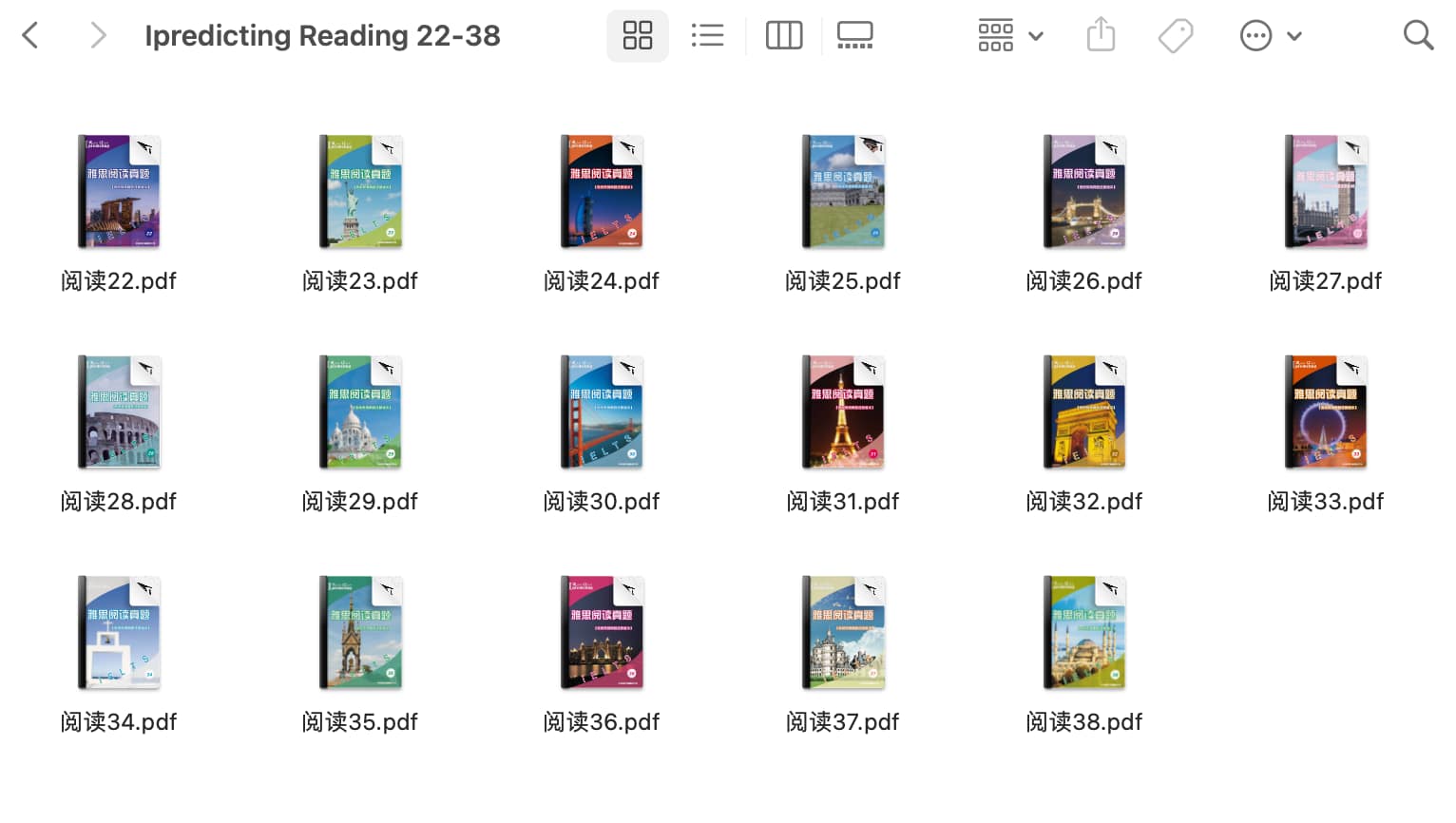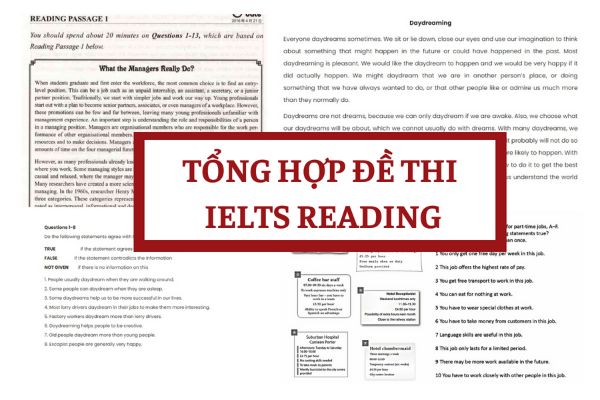Việc dự đoán đề thi Reading IELTS trong tương lai là một nhiệm vụ khá khó khăn vì đề thi luôn thay đổi và không thể biết chính xác về nội dung cụ thể của từng đề. Tuy nhiên, bạn có thể chuẩn bị cho bất kỳ đề thi nào bằng cách nắm vững các chủ đề phổ biến và luyện tập đọc nhiều loại tài liệu khác nhau. Còn dưới đây Aten English sẽ dự đoán đề Reading IELTS 2023 bạn nên tìm hiểu và download nhé!
Đề thi IELTS Reading
IELTS Reading Test bao gồm 3 phần, mỗi phần có một đoạn văn (Passage). Mỗi đoạn văn có thể có độ dài khác nhau. Trong đề thi IELTS General Training, đoạn văn thường có khoảng 700-1500 từ, trong khi đề thi IELTS Academic thì đoạn văn thường dài hơn, xấp xỉ 1500 từ hoặc hơn. Nội dung của các đoạn văn cũng khác nhau dựa trên loại đề thi, nhưng các dạng bài thi hầu hết đều giống nhau.

Có 10 dạng câu hỏi trong Reading là:
- True/ False/ Not given, Yes/No/ Not Given
- Matching Heading Questions
- Matching features – Nối đặc điểm
- “Matching information”
- Matching endings – Hoàn thành câu chưa hoàn chỉnh
- Multiple choice – Chọn đáp án
- “Short answer questions”
- “Completing tables, charts, note, diagrams”
- Completing sentences – Hoàn thành câu
- Completing diagrams
Dự đoán đề Reading IELTS 2023
Bạn có thể tham khảo dự đoán đề Reading IELTS 2023 trong sách Cambridge 14 như sau:
xem thêm: Các dạng bài Reading IELTS và cách làm chi tiết
READING PASSAGE 1
You should spend about 20 minutes on Questions 1-13, which are based on Reading Passage 1 below.
THE IMPORTANCE OF CHILDREN’S PLAY

Brick by brick, six-year-old Alice is building a magical kingdom. Imagining fairy-tale turrets and fire-breathing dragons, wicked witches and gallant heroes, she’s creating an enchanting world. Although she isn’t aware of it, this fantasy is helping her take her first steps towards her capacity for creativity and so it will have important repercussions in her adult life.
Minutes later, Alice has abandoned the kingdom in favour of playing schools with her younger brother. When she bosses him around as his ‘teacher’, she’s practising how to regulate her emotions through pretence. Later on, when they tire of this and settle down with a board game, she’s learning about the need to follow rules and take turns with a partner.
‘Play in all its rich variety is one of the highest achievements of the human species,’ says Dr David Whitebread from the Faculty of Education at the University of Cambridge, UK. ‘It underpins how we develop as intellectual, problem-solving adults and is crucial to our success as a highly adaptable species.’
Recognising the importance of play is not new: over two millennia ago, the Greek philosopher Plato extolled its virtues as a means of developing skills for adult life, and ideas about play-based learning have been developing since the 19th century.
But we live in changing times, and Whitebread is mindful of a worldwide decline in play, pointing out that over half the people in the world now live in cities. ‘The opportunities for free play, which I experienced almost every day of my childhood, are becoming increasingly scarce,’ he says. Outdoor play is curtailed by perceptions of risk to do with traffic, as well as parents’ increased wish to protect their children from being the victims of crime, and by the emphasis on ‘earlier is better’ which is leading to greater competition in academic learning and schools.
International bodies like the United Nations and the European Union have begun to develop policies concerned with children’s right to play, and to consider implications for leisure facilities and educational programmes. But what they often lack is the evidence to base policies on.
‘The type of play we are interested in is child-initiated, spontaneous and unpredictable – but, as soon as you ask a five-year-old “to play”, then you as the researcher have intervened,’ explains Dr Sara Baker. ‘And we want to know what the long-term impact of play is. It’s a real challenge.’
Dr Jenny Gibson agrees, pointing out that although some of the steps in the puzzle of how and why play is important have been looked at, there is very little data on the impact it has on the child’s later life.
Now, thanks to the university’s new Centre for Research on Play in Education, Development and Learning (PEDAL), Whitebread, Baker, Gibson and a team of researchers hope to provide evidence on the role played by play in how a child develops.
‘A strong possibility is that play supports the early development of children’s self-control,’ explains Baker. ‘This is our ability to develop awareness of our own thinking processes – it influences how effectively we go about undertaking challenging activities.’
In a study carried out by Baker with toddlers and young pre-schoolers, she found that children with greater self-control solved problems more quickly when exploring an unfamiliar set-up requiring scientific reasoning. ‘This sort of evidence makes us think that giving children the chance to play will make them more successful problem-solvers in the long run.’
If playful experiences do facilitate this aspect of development, say the researchers, it could be extremely significant for educational practices, because the ability to self-regulate has been shown to be a key predictor of academic performance.
Gibson adds: ‘Playful behaviour is also an important indicator of healthy social and emotional development. In my previous research, I investigated how observing children at play can give us important clues about their well-being and can even be useful in the diagnosis of neurodevelopmental disorders like autism.’
Whitebread’s recent research has involved developing a play-based approach to supporting children’s writing. ‘Many primary school children find writing difficult, but we showed in a previous study that a playful stimulus was far more effective than an instructional one.’ Children wrote longer and better-structured stories when they first played with dolls representing characters in the story. In the latest study, children first created their story with Lego , with similar results. ‘Many teachers commented that they had always previously had children saying they didn’t know what to write about. With the Lego building, however, not a single child said this through the whole year of the project.’
Whitebread, who directs PEDAL, trained as a primary school teacher in the early 1970s, when, as he describes, ‘the teaching of young children was largely a quiet backwater, untroubled by any serious intellectual debate or controversy.’ Now, the landscape is very different, with hotly debated topics such as school starting age.
‘Somehow the importance of play has been lost in recent decades. It’s regarded as something trivial, or even as something negative that contrasts with “work”. Let’s not lose sight of its benefits, and the fundamental contributions it makes to human achievements in the arts, sciences and technology. Let’s make sure children have a rich diet of play experiences.’
Questions 1-8 Complete the notes below.
Choose ONE WORD ONLY from the passage for each answer.
Write your answers in boxes 1-8 on your answer sheet.
Children’s play
Uses of children’s play
building a ‘magical kingdom’ may help develop 1…….
board games involve 2 ……. and turn-taking
Recent changes affecting children’s play
populations of 3……. have grown
opportunities for free play are limited due to
– fear of 4 …….
– fear of 5 …….
– increased 6 …….in schools
International policies on children’s play
it is difficult to find 7 …….to support new policies
research needs to study the impact of play on the rest of the child’s8 …….
Đây là dự đoán đề Reading IELTS 2023 mà bạn có thể tải về và sử dụng để luyện tập. Bộ tài liệu này chỉ bao gồm đáp án, vì vậy bạn nên áp dụng các chiến thuật và phân tích để hiểu cách làm bài. Từ đó, bạn sẽ tích lũy được kinh nghiệm làm bài cho bản thân và sau đó sẽ dễ dàng áp dụng trong các bài Luyện thi IELTS Reading .


